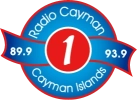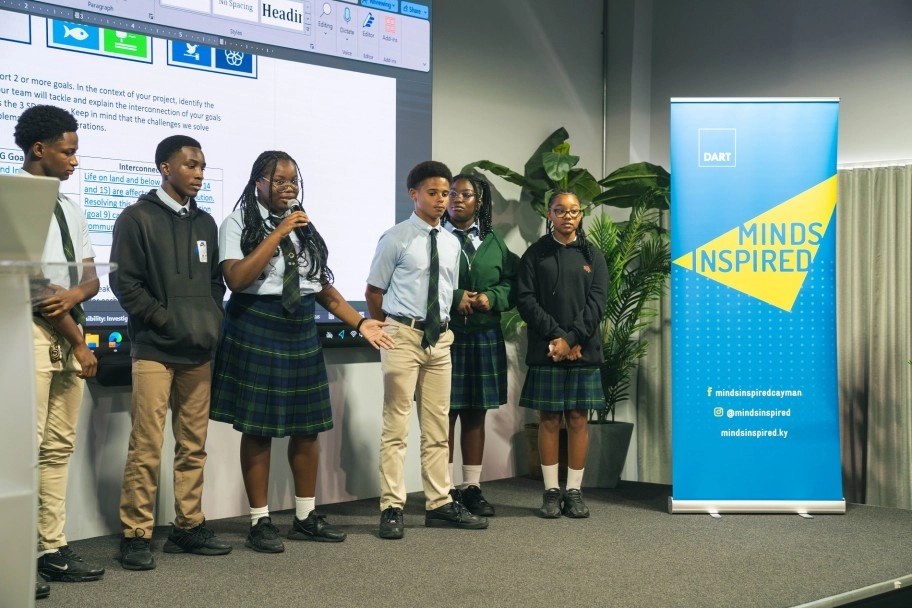Buses, bricks and biospheres: sustainable solutions for Cayman
Buses, bricks and biospheres: sustainable solutions for Cayman
When 40 high school students were challenged to come up with sustainable solutions to Cayman’s most pressing issues, three topics emerged as clear priorities: a more reliable bus system, greener building materials and educating young people on how climate change impacts the Cayman Islands.
On 25 April, six schools presented their ideas to a panel of sustainability experts in the final round of the Minds Inspired SDG Challenge, an inter-school competition based on the United Nations’ 17 Sustainable Development Goals applied to a Cayman context.
Each team of seven high school students had five minutes to pitch their projects for the chance to win funding to help progress their ideas, with judges awarding points for feasibility and impact, as well as presentation skills, teamwork and the quality of research and content.
The winner was Grace Christian Academy’s “Bus 345” app which proposed using technology to keep passengers informed with real-time information on routes, wait times and seat availability in the existing bus network.
The Grace Christian Academy team conducted a survey of more than 300 passengers and 30 drivers which showed 70% of users consider the current service unreliable. Having researched past attempts at a bus app and spoken with local technology providers, the team impressed judges with their carefully researched prototype for the app, which supports SDG Goal 11 Sustainable Cities and Communities.
The team from St Ignatius had also identified the bus system as an area for improvement, having initially considered bike lanes for their project. Their primary focus was on the congestion near the multiple schools on Walkers Road and the lack of safe alternatives to cars at school pick-up time.
More sustainable building methods
In keeping with SDG Goal 9 Industry, Innovation and Infrastructure, the teams from Cayman Prep and High School and Cayman Academy sought to find greener alternatives to traditional building materials that have a large carbon footprint.
Earning an honourable mention for their innovation and scientific experimentation, Cayman Prep’s SargaSafe project proposed making bricks out of sargassum, a method pioneered in Mexico. The team produced a prototype brick, made by gathering sargassum from a beach in East End and mixing with construction dirt. Their idea extended to using these bricks to construct hurricane shelters, as current capacity can only accommodate six percent of the population.
Cayman Academy’s project ‘Poly Pave’ proposed using recycled plastic to build roads, taking inspiration from India where plastic roads have already been trialled. The team acknowledged that questions remain about the durability of plastic as there is not yet sufficient real-life data, so suggesting starting with a sidewalk and becoming part of the research and development into more sustainable building materials.
Green festivals
The teams from Cayman International School and John Gray High School pitched their ideas for an ‘eco festival’ as a way to raise awareness of climate issues and educate young people about protecting Cayman’s precious natural resources.
John Gray’s Cayman Coral Conservation Fair, which aligns with SDG 14 Life Below Water, envisioned a school fair with a range of learning activities focused on marine issues such as coral bleaching, over-fishing and invasive species. Their survey of fellow students revealed the majority stated a preference for hands-on learning and they proposed a second survey after the fair to evaluate its educational benefits. The John Gray team’s end goal would be to incorporate marine science into the curriculum, an aspiration supported by the judges who awarded an honorable mention to the John Gray team.
Cayman International School also sought to share climate information and engage young audiences with their proposal for Ecofest: The Cayman Islands first climate change festival.” The event’s aim is to make learning fun by combining in the chance to interact with environmental organisations with live music and food stalls.
The SDG Challenge
Teams participating in the SDG Challenge were given two months to research, develop and present their projects. In February, students heard from experts on economic, social and environmental issues in the Cayman Islands. In March, a second group session shared tips on research, pitching and how to apply for grants, preparing students for the final round of presentations to the judges last Thursday.
The independent panel of judges included Hannah Reid Ford, Senior Policy Advisor in the Ministry of Sustainability and Climate Resiliency; Cleveland Julien, UCCI’s project manager for the UCCI Sustainability Initiative; Gary Gibbs, Dart’s executive vice president of development; Jack MacKenzie, a senior manager on KPMG’s ESG Advisory team; and Jessica Barefoot, landscape architect and owner of Naked Foot.
The judges were impressed by the effort, thought and research put in by all six schools in addressing complex challenges. Ultimately, the judges selected Grace Christian Academy’s Bus 345 as this year’s winner for the project’s feasibility as well as the amount of research, cost consideration and input from local vendors the team had shown.
The winning school receives $1,000 to help progress sustainability initiatives, and team members each receive a reference letter from Dart CEO Mark VanDevelde. This year’s winners from Grace Christian Academy team are Rozalyn Thompson-Ebanks, Isabell Akagac, Dylan Smith, Lacey Victoria Arch, Durk Tatum, Tashyla Thompson-Brown and Rhea Timothy with their teacher Ms Deepali Mutneja.
“The SDG Challenge is an excellent addition to our annual programme of educational events,” said Glenda McTaggart, Dart’s senior manager for education programmes who also runs inter-school maths and robotics competitions under the Minds Inspired banner. “It helps develops critical thinking and problem-solving skills, as well as encouraging students to think about a more sustainable future for the Cayman Islands. We are grateful for the support from our judges and sustainability experts and hope to see some of these fantastic ideas put into action.”
Information about how to apply for the SDG Challenge and dates for next year can be found at MindsInspired.ky.
Latest News
-
Explanation of Cayman Brac Water Quality Incident and ResolutionHealth, Uti...16 December 2025, 05:32 AM
-
Third Meeting of 2025–2026 Parliamentary Session Delivers Legislative Progress with Commitment to TransparencyParliament16 December 2025, 05:30 AM
-
Police Investigate Collisions Involving PedestriansPolice/Cou...16 December 2025, 05:28 AM
-
Increased Fees for BOTC Applications Effective 1 JanuaryGovernment16 December 2025, 05:27 AM
-
Rocky’s Diamond Gallery rings in the Holidays with Business After HoursBusiness16 December 2025, 05:26 AM


